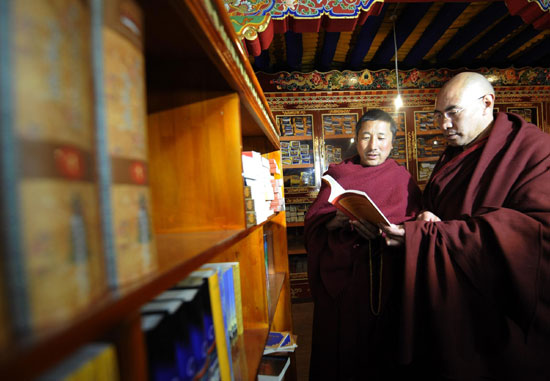Elderly Tibet monks, nuns gets pension
Updated: 2012-03-14 10:38
(Xinhua)
|
|||||||||||
LHASA - All monks and nuns in Tibet aged over 60 will get a basic pension allowance from this year as local authorities move to ensure their quality of life.
Thirty-seven monks at a major monastery in Lhasa, capital of Tibet autonomous region, received the government-funded basic pension on Monday afternoon, an official with the city's human resources and social security bureau said Tuesday.
It's the first time in the 1,300-year history of Tibetan Buddhism that the clergies get a pension allowance from local government, said Doje Namgyai, head of the bureau's rural insurance department.
 |
|
Tibetan monks read Buddhist sutra at Jokhang Temple in Lhasa,Tibet autonomous region on Jan 27, 2012. [Photo/Xinhua] |
Each clergy member aged over 60 in Tibet can now get a basic pension of 120 yuan per month without having to pay any premiums, said Doje Namgyai.
"We used to live only on the temple's earnings and believers' donations. But now, with the pension allowance, our life can be better," said Changchub, an elderly monk at the Sera Monastery.
"This has never happened before in history! It can help to get rid of the worries over the livelihood among elderly clergies," he said.
Around 1,900 monks and nuns across Tibet will receive the basic pension this year, according to Lhasa's human resources and social security bureau.
The sum of the pension more than doubled the 55 yuan paid each month to senior citizens in Tibet's rural regions.
Younger Tibetan monks and nuns are also covered by the pension insurance program.
They can choose to pay from 100 to 3,000 yuan a year into their pension accounts. After they turn 60, and providing they have paid into the premiums for 15 years or more, they can get 134 to 452 yuan a month as a basic pension, plus interest earnings from their pension accounts.
The civil affairs authorities also planned to expand the minimum subsistence allowance program to cover all monks and nuns in the southwestern Tibetan Autonomous Region.
"The minimum living standard for Tibetan clergies is 400 yuan a month. If their monasteries earnings fell short of the standard, the government will pay to close the gap," said Lhagba Khyungten, an official with Tibet's regional bureau of civil affairs.
Meanwhile, Tibetan monks and nuns are covered by government-subsidized medical insurance. Local health authorities pay up to 85 percent of their medical costs.
"The three insurances help to solve the clergies' actual difficulties and relieve their heavy life burden," said Soinam Rinje, executive deputy director of the Tibet regional united front work department.
Related Stories
Tibet earmarks $1.3 b for rural support 2012-02-04 20:58
Tibet village raises toast to housing program 2012-02-06 08:10
Tibet received 8.7 million tourists last year 2012-02-13 15:42
Tibet Airlines to fly 3 new routes from Nyingchi 2012-02-03 17:19
Today's Top News
President Xi confident in recovery from quake
H7N9 update: 104 cases, 21 deaths
Telecom workers restore links
Coal mine blast kills 18 in Jilin
Intl scholarship puts China on the map
More bird flu patients discharged
Gold loses sheen, but still a safe bet
US 'turns blind eye to human rights'
Hot Topics
Lunar probe , China growth forecasts, Emission rules get tougher, China seen through 'colored lens', International board,
Editor's Picks

|

|

|

|

|

|





